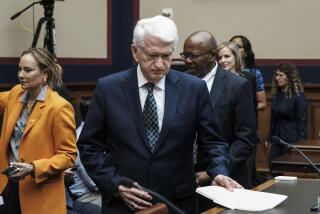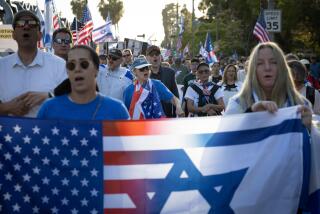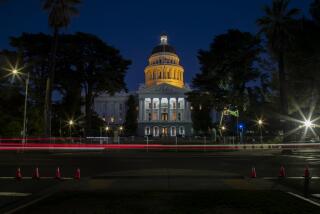RELIGION / JOHN DART : Rabbi Earns Role as Role Model : Leadership: Jerrold Goldstein is honored by the Hillel Council for his ethics. His activism often put him in risky situations.
- Share via
Since the time he was jailed briefly while supporting a civil rights protest led by the Rev. Martin Luther King Jr. and through the years of helping Jewish college students relate their heritage to events around them, Rabbi Jerrold Goldstein has been an ethical role model.
So says the national Hillel Council, which last month honored Goldstein, 57, for “a professional career of exemplary ethical behavior.”
Goldstein has been the rabbi for the Cal State Northridge Hillel Council for the last seven years. The previous 14 years he served the same role at Valley College and Pierce College.
The in-house Hillel award certainly is a little-known honor. However, when many clergy make the news because of sexual dalliances, child molestation or other moral failures, it may be refreshing to hear of an ordained person cited for upright ethics.
Could it also bring unwanted pressure or scrutiny?
“No, I don’t think there are any embarrassing ghosts in my closet,” Goldstein said.
“I’ve been a rabbi for 30 years and I’m sure somebody along the line feels I didn’t do right by them,” he said. “I’ve done what I could to help students mature and grow in their own values and appreciation of Judaism as a resource in their lives.”
He was given the Jacob Berns Ethics Award for staff recognition at the organization’s conference on Dec. 22.
“People have seen Jerry in action in a variety of settings,” said Ruth Cernea, director of the ethics award foundation. “With Jerry, it feels right.”
Goldstein was trained in the socially liberal Reform branch of Judaism, and those convictions were tested alongside the alongside the Rev. King early in Goldstein’s career.
It’s a story Goldstein will recount Monday night during the San Fernando Valley Interfaith Council’s annual birthday service for King at Congregation Kol Tikvah in Woodland Hills.
In 1964, he went with 15 other rabbis to join King and his followers in St. Augustine, Fla., in a protest against segregated facilities.
As the racially mixed group moved through a section popular with tourists, it encountered a hostile crowd. “I still remember very angry people standing along the curb with broken bottles in their hands,” he said. “There was only a line of state troopers between us and them.”
The next morning, Goldstein said: “I was paired with a black man, and he and I were going to go to lunch together, but we never got as far as the front door of the diner. We were all arrested for conspiracy, disturbing the peace and something else I can’t remember while we were standing in a prayer circle in a parking lot. We spent the night in jail and eventually the NAACP posted bail to release us.
“I think it’s important for clergy to be models of the values for which we stand,” the rabbi said.
Recently at Cal State Northridge, Goldstein had the task of helping Jewish students handle their objections to a November campus appearance by Nation of Islam leader Louis Farrakhan, whom Jewish groups have accused of making anti-Semitic statements.
The Hillel Council, which is student-run, decided to hold a campus meeting on the day of Farrakhan’s appearance, calling it A Gathering of People for Understanding.
“During the whole controversy, Jerry kept a level head and supported the student board in its actions,” said senior Josh Epstein, who chairs the council. “He helped us get through some very difficult days.”
During the farm labor union organizing efforts of the 1960s and 1970s, Goldstein marched with Cesar Chavez. In keeping with Reform Judaism’s Central Conference of American Rabbis, which accused many growers of table grapes of exploiting workers, Goldstein endorsed the United Farm Workers’ boycott of the product.
“To this day, table grapes are not kosher for this Hillel house,” Goldstein said.
More to Read
Sign up for Essential California
The most important California stories and recommendations in your inbox every morning.
You may occasionally receive promotional content from the Los Angeles Times.










